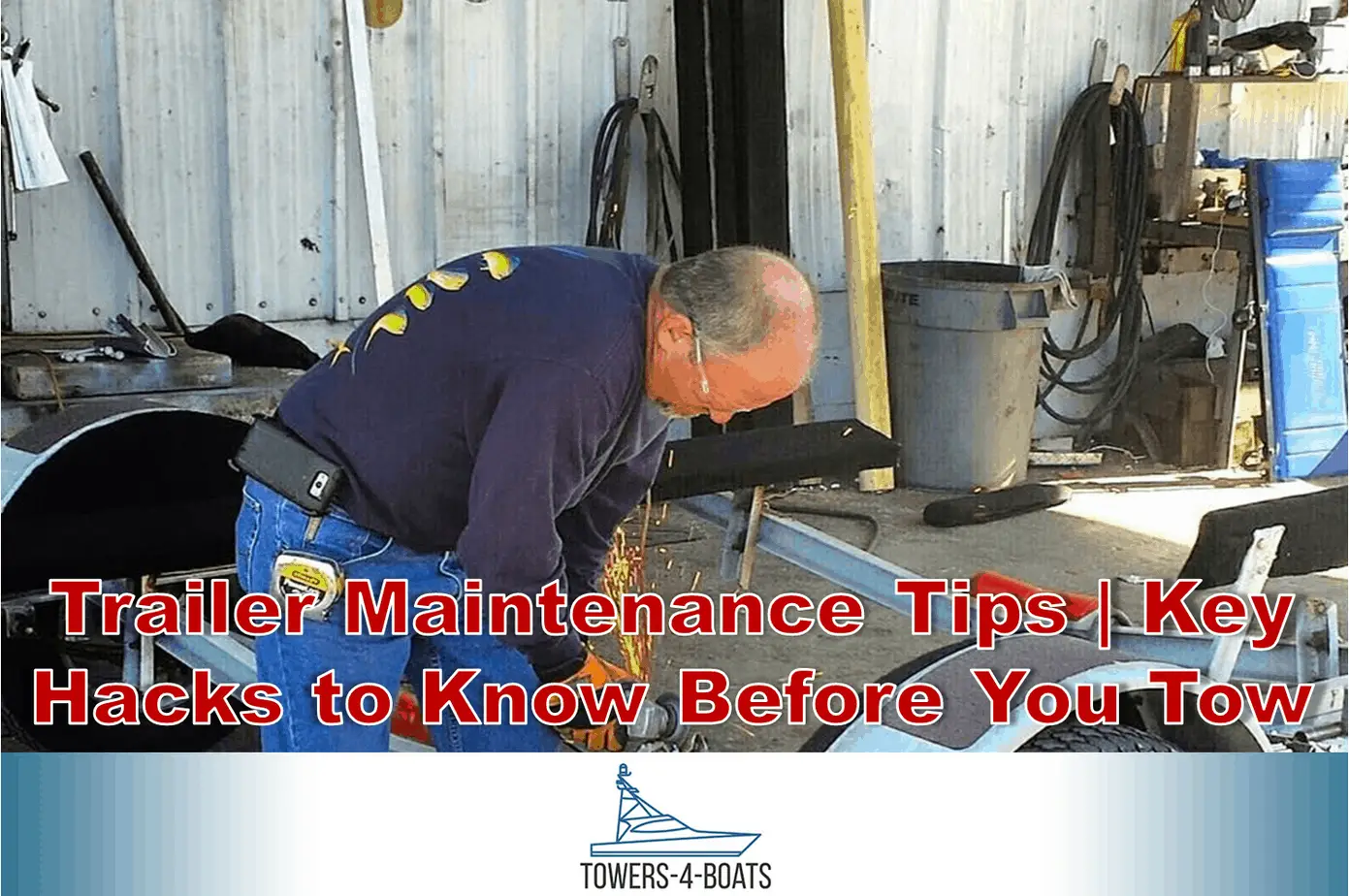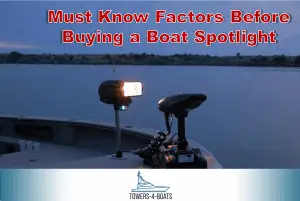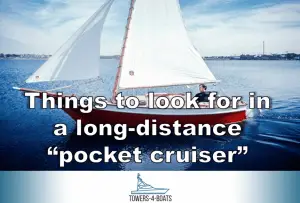Boat Trailer Maintenance Tips from Longtime Owners
With a boat in tow, visiting new places is just part of the lifestyle of boating.
It is crucial to have the right trailer.
However, the most important thing is the repair of boat trailers.
Especially if you travel all the time and visit new destinations. It can take some time and effort, but to ensure that your trailer is in top shape and to ensure that you and your boat get in one piece to your destination is a required safeguard.
Over the years, I have seen more than a few trailer maintenance problems (and a couple of tragic accidents) that could all have been avoided with only a little care and basic knowledge of trailering.
A fellow boater was heading out on a cruise, towing a 30-foot runabout, in one case. Pulling out of the parking lot, he underestimated the narrow path between the concrete barrier and the house. Until I heard a loud “bang,” followed by a disheartening “thud,” everything seemed perfect.
What happened was the driver with the right trailer fender struck the edge of the concrete barrier, and the impact pushed part of the boat off the trailer at a steep downward angle. You don’t want to see what the hitch afterward looked like.
Needless to say, before it ended, his trip was done.
Although he was an accomplished boater with several miles of ship trailing to his name, the point is that when towing a boat, a lot of caution needs to be taken. It all begins with common basic maintenance and is very familiar with your rig.
Read our article to learn if your car can tow your boat.
Top Ideas to Try
Since the checklist for the maintenance of a boat trailer can be very detailed, here are a few starting points to ensure safe road travel.
1. Make Sure Everything Is In Good Condition
Towing countless highway miles or trekking through rugged, backcountry roads will take its toll if you’re like many anglers I know.
Components wear down over time. They could even wear down more easily than you expect. Before hitting the lane, you will always want to give your boat trailer a good once-over to prevent any surprises.
Check these issues before, after and even during a trip:
- Is the coupler fitting snugly over the hitch ball in good condition?
- Is the tongue jack lubricated properly? For the rack/pinion inside, most trailers have grease fittings. If there is a lock pin with a ball that is spring-loaded, make sure that it is also properly greased.
- Are the safety chains tightly fastened and in good condition?
- Are the bunks in good shape or is the carpeting ripped or frayed?
- In what manner are the leaf springs? It may cause major problems with broken, corroded, or heavily rusted leaf springs. Throughout the season, inspect these closely.
- Often check for tension cracks, loose nuts/bolts, or rusted fasteners.
Popular trailer tests mean safer journeys. It also ensures that before they do any serious harm, you are forced to get problems resolved.
Check out this video on Boat Trailer Maintenance.
2. Check Tire Pressure
The unsung heroes of towing are trailer tires and should not be overlooked. A blow-out of a tire, worn-out bearings, and improper PSI all mean trouble.
Proper tire inflation is important, as with any road vehicle.
What happens when tire inflation is too low or too high? Signs of low PSI (after long periods) include wearing on the inside and outside edges of the rubber, according to Shoreland’s Trailers. When there’s so much PSI, the exact opposite occurs. There will be worn on the tire at the base of the tread. To correct both cases, simply obey the proposed PSI rating suggested by the manufacturer.
Many trailers have a sticker plate showing the correct tire size for the trailer and the maximum PSI on the sidewall is indicated by most tires.
Before, during, and after every ride, I like to check the tires. If the PSI is tiny, it takes me a few minutes to inflate the PSI up to the rating of the maker.
3. Replace Worn or Damaged Tires
There are several types of trailer tires on the market, with bias-ply and radial being the most common. Knowing the difference is crucial.
Bias-ply sidewalls are more affordable and ideal for short trips and have a stiffer construction (that can help with trailer sway).
Radial tires cost more, but tend to decrease the accumulation of heat, have more load capacity, and produce less noise on the lane.
Yet, regardless of the trailer’s tires, it’s always important to do the following:
- Stop having tires, when not in use, rest on the bare ground. Underneath the tires, put a thick sheet of plywood or park the trailer on concrete.
- When your trailer is sitting in the heat for long periods, use tire covers.
- Regularly inspect the tire stems.
- Always search for tread depth. Take a penny and put it on the tread to do that. If the head of the figure on the coin can be seen, the tire tread is worn and it is appropriate to replace the tire.
4. Check Your Wheel Bearings
The wheel bearings of your trailer should be resealed/repacked once a year.
Trailer bearings simply allow the wheel to spin with minimal friction and there is always a need for a constant supply of grease.
The bearings can produce excessive heat without grease (which should be practically waterproof), which can destroy the bearings, wheels, and even axles.
Replace your wheel bearings when:
- Grease forms around the exterior of the wheel hub. This means the oil has seeped out and needs to be re-greased until the bearings have been lubricated.
- Squeaks or grinding noises are heard.
- The wheel doesn’t spin freely (or any resistance exists).
The job of repacking/resealing bearings does not require an engineering degree and serious do-it-yourselfers will accomplish it.
But if you’re like me and just trust the experts, go to your nearest dealer for advice.
5. Are Your Lights Working
There are strict laws concerning trailer lights, according to the National Highway Traffic Safety Administration (NHTSA) of the United States Department of Transportation.
You need them, in other words, regardless of the state in which you fly. The NHTSA also notes that to have stop lights, tail lights, turn signals, and reflectors, boat trailers are required. Additional lights and reflectors include trailers that are 80 inches wide or over 30 feet long.
Many trailers have the electricity for lights that run through the trailer tubing, but they should still be firmly connected to wires that are not.
Often double-check for: when checking your trailer lights,
- Burnt-out bulbs that need replacement.
- Cracked wires or connections, or hurt.
- Cracked lenses or loose ones.
- A working fuse. Electricity flows from the tractor to your tow vehicle and your trailer lights do so when the fuse fails.
- Electric grease to safeguard some connectors.
6. Make Certain Things Are Secure
On the sea, boating safety is important. When trailing, it is also important to practice road safety. Common sense is a lot of it.
Before you hit the lane, safety starts well. This is particularly necessary to remember when you need to refresh your trailering skills after a long winter.
Always double check and make sure:
- Tie-down straps are fastened tightly in place.
- The trailer brakes are in excellent condition.
- All the electrical power is connected properly.
- The towing vehicle has sufficient tire pressure (keep it on hand and keep it onboard).
- To achieve a balanced load, boat gear is uniformly distributed.
- For added convenience, to transport essential spare parts, required instruments and a spare trailer tire hooked on your tire carrier.
Over time, maintenance of boat trailers will become almost second nature and understanding repairs will lead to more pleasant experiences on the road as well as at your destination before they happen.




